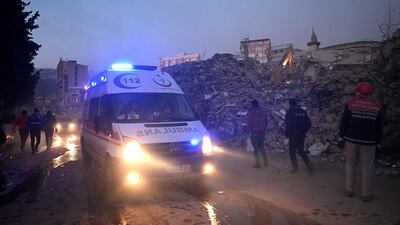Follow the latest news on the earthquake in Turkey and Syria
A week after a 7.8-magnitude earthquake devastated large areas of Turkey and northern Syria, aid agencies and governments assisting the stricken region are becoming aware of the scale of the crisis.
They are also warning of secondary calamities, such as cholera outbreaks, among the millions of displaced.
On Sunday, UN humanitarian aid co-ordinator Martin Griffiths said rescue efforts would be winding down; experts warn that after five days, the chances of finding people alive under rubble drop to below 10 per cent.
"The rescue phase is dragging live people out from the rubble and finding those who died in the rubble. That's coming to a close," he said. "Now, the humanitarian phase, the urgency of providing shelter, psychosocial care, food, schooling and a sense of the future for these people, that's our obligation now."
The destruction now makes the earthquake the worst on record in Turkey, with tens of thousands of buildings destroyed over an area 500km in diameter, directly affecting 13.5 million people, or more than 15 per cent of the population. The Erzincan earthquake — the last comparable disaster in Turkey — claimed about 32,000 lives in 1939.
At least 150,000 emergency service workers are working on disaster rescue and aid efforts. In the longer term, the cost of rebuilding the affected area could be as high as $84 billion, according to the Turkish Enterprise and Business Confederation, which claims to represent 50,000 companies across the country.
Aside from the long-term cost, an initial estimate by the Bank of America indicates the earthquake has caused as much as $5 billion in damage to buildings, with at least $3bn needed for immediate humanitarian relief.
This is a conservative estimate, the bank warned, saying infrastructure repair and other costs such as supporting those recovering from the disaster will raise the total significantly.
On Sunday, Turkey’s Environment Minister Murat Kurum said more than 25,000 buildings were destroyed or damaged in Turkey, of 170,000 evaluated.
In Syria, more than five million people are thought to have been displaced.
That means that in less than an hour last Monday morning, nearly half the total displacement of the 12-year civil war occurred, including people who fled the country or were forced to move to other areas.
Before the quake, about six million people in Syria were internally displaced by conflict, most of them living in northern Syria, which was the hardest hit by last week’s disaster.
As many as 23 million people have been affected in both countries across an area of 120,000 square km.
Both face almost incalculable economic damage. Turkey is well placed to recover in the near-term compared to Syria, which has been in a state of near total economic collapse after 12 years of war.
But Ankara is already contending with high inflation and a growing deficit.
One million people in Turkey are now living in temporary accommodation, including tent cities hastily erected to shelter people in freezing temperatures, the Turkish government says.
To ease the crisis, the World Bank on Friday said $1.78 billion was being put aside to help Turkey, while it prepared “a rapid assessment of the urgent and massive needs”, president David Malpass said.
The bank said $780 million would be distributed immediately as part of a growing international aid package.
About 100 countries have made significant donations of aid or have sent specialist rescue teams.
Growing anger at UN
In Syria, the disaster has sparked growing debate on how aid is distributed after the UN acted slowly to increase the amount of assistance in northern Syria through Bab Al Hawa, the one crossing point authorised by the Security Council.
The Syrian government, supported by Russia and China at the UN, insists that all aid must be co-ordinated through Damascus because large parts of northern Syria along the border with Turkey are still controlled by rebel groups, including a coalition of militias backed by Turkey, and Al Qaeda-linked extremists. Aid agencies insist that humanitarian relief has been possible in northern Syria for years without assisting terrorist groups.
This has left UN officials increasing efforts to take the politics out of aid distribution in the north of the country.
Mr Griffiths said on Sunday that he would work hard to achieve a quick consensus on aid in northern Syria and acknowledged that the UN had so far “failed” to assist Syrians.
Some regional countries have joined an initial aid effort in northern Syria, including Egypt, Jordan and Qatar, while some UN aid has made it to hard-hit areas.
However, Syrian opposition groups say it is far from adequate and there have been small public protests in some areas to decry the slow UN response so far.
Meanwhile, a spokesman for the UN's humanitarian aid office told Reuters that “there are issues with [aid] approval” raised by Hayat Tahrir Al Sham, an Al Qaeda-linked umbrella group of opposition militants, which controls the north-western province of Idlib, home to at least one million displaced people.
The group allegedly said it did not want Damascus to benefit from aid distribution into Idlib from within Syrian territory.
The EU was also accused acting slowly to hasten the distribution of aid, but it strongly denied the claims on Sunday.
Dan Stoenescu, head of the EU delegation to Syria, said it was “unfair to be accused of not providing aid, when actually we have constantly been doing exactly that for over a decade and we are doing so much more even during the earthquake crisis”.
The first shipment of European earthquake aid to government-held parts of Syria arrived in Damascus on Sunday.


